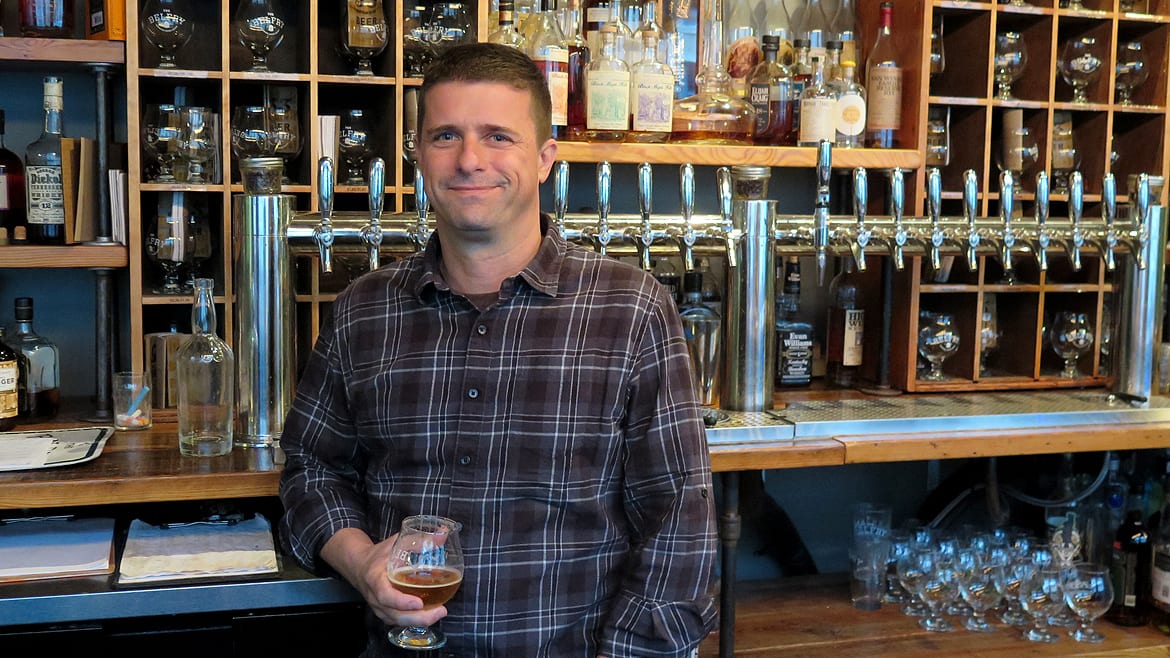On Tap | Boulevard Veteran Neil Witte Takes Beer Quality on a Field Trip
 Neil Witte hopes to change the way beer is served. (Photo: Pete Dulin I Flatland)
Neil Witte hopes to change the way beer is served. (Photo: Pete Dulin I Flatland)
Published January 3rd, 2017 at 5:00 PM
There are two kinds of beer-nerd palates: yours and Neil Witte’s.
Witte oversaw field quality and training at Boulevard Brewing and Duvel Moortgat USA for most of the past 20 years. He is one of the 11 people on the planet to have passed the Master Cicerone exam. And he has an unsparing assessment to share about the ever-ballooning craft-beer bubble.
“I’ve had more mediocre to bad beer in the past five years than I have in a long time,” Witte tells me.
So Witte has launched Craft Quality Solutions, a consultancy designed to address a key question that’s easily taken for granted: Who’s taking care of your beer outside the brewery?
Brewers produce beers with specific flavors, aromas and reactions in mind. How a keg or a packaged beer is handled by the distributor or a retailer or a bartender affects the quality of the beer served. Inattentive or inconsistent handling ruins the brewer’s hard work and sullies the beer drinker’s experience.
Witte’s new company, he says, will provide “scalable, market-based quality audits and services” to breweries, distributors and retailers when it opens this month. He adds: “For brewers, I can provide solutions to address whatever issues might be uncovered, including salesperson training or distributor and retailer consultation.”
If anyone can make such a pledge, it’s Witte. He joined Boulevard in 1997 as a brewer. In 2000, Boulevard Brewery founder John McDonald moved Witte into a position managing field quality.
Boulevard was one of the first craft brewers to have a dedicated full-timer working on field quality. And even now, Witte notes, only about half a dozen craft breweries have such a person on the payroll — though the number of U.S. breweries recently passed the 5,000 mark.
“Just like any boom market, like craft beer has been, there are a lot of people getting into it who don’t really know what they’re doing or are just trying to make a quick buck,” Witte says. “With the industry still growing like crazy, it’s starting to become an issue. Field quality work is one of those things that lots of people in the supply chain pay a little attention to and, because of that, is often something that slips through the cracks.”
At Boulevard, Witte kept the cracks sealed by working with sales reps, distributors and retailers to prevent or correct variations in quality that emerged in the post-production marketplace. Sometimes it was as simple as teaching the correct methods for cleaning glassware and pouring and serving beer. Sometimes there were issues with a draught-system design or installation.
“I probably installed several hundred draught systems throughout the Midwest over the years,” Witte says. “As the role evolved, I began to do more educational instruction as well. The Master Cicerone certification led to lots of requests from distributors and retailers to educate them about all manner of beer topics. When Boulevard became part of Duvel USA, I kept my same position with the larger company.”
With Craft Quality Solutions, Witte will spread his quality gospel more widely.
He’ll work with breweries, which often rely on sales reps or distributors who are too busy or too inexpert to properly address quality. He’ll consult with draught departments to teach them how to better maintain their systems, which are subject to a complex supply chain.
Then there are the distributors, which provide the most tangible services in most states; many of them install draught systems and clean draught lines, sending street reps to visit accounts and — ideally — check date codes. Suppliers also have their own reps with a duty to shepherd their beer through the supply chain. Witte says. “Their reps need to be trained to recognize where a potential off-flavor might come from in a draught system, for example.”
Finally, taverns have their own quality obligations. “Bars that frequently rotate draught beers might need to take on line-cleaning responsibilities,” Witte says.
“A brewery absolutely has to have the highest-quality beer to survive,” he says. Not the best beer, necessarily — but best-supervised beer. Which should keep Witte busy.
— Pete Dulin writes about food trends for Flatland and is the author of the “KC Ale Trail.” Follow @FlatlandKC on Twitter for more food news and trends. On Tap is presented by Flatland and The Pitch. A full archive of The Pitch‘s beer coverage is at pitch.com.


